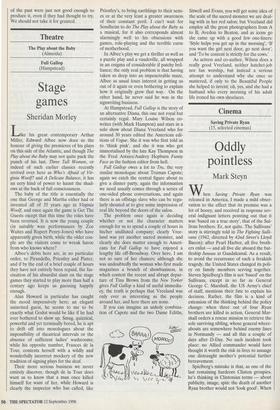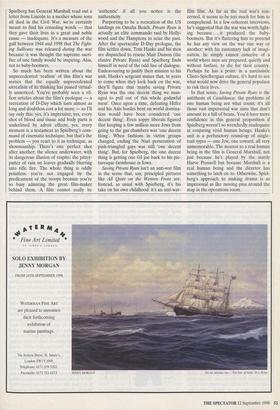Cinema
Saving Private Ryan (15, selected cinemas)
Oddly pointless
Mark Steyn
When Saving Private Ryan was released in America, I made a mild obser- vation to the effect that its premise was a lot of hooey, and received in response sev- eral indignant letters pointing out that it was 'based on a true story', that of the Sul- livan brothers. Er, not quite. The Sullivans' story is stirringly told in The Fighting Sulli- vans (1942, directed by 42nd Street's Lloyd Bacon): after Pearl Harbor, all five broth- ers enlist — and all five die aboard the bat- tleship Juneau at Guadalcanal. As a result, to avoid the recurrence of such a freakish tragedy, the United States changed its poli- cy on family members serving together. Steven Spielberg's film is not 'based' on the Sullivans, except in so far as General George C. Marshall, the US Army's chief of staff, mentions their fate to explain his decision. Rather, the film is a kind of extension of the thinking behind the policy change: when three out of four Ryan brothers are killed in action, General Mar- shall orders a rescue mission to retrieve the sole surviving sibling, whose general where- abouts are somewhere behind enemy lines in Normandy — and all this a couple of days after D-Day. No such incident took place: no Allied commander would have thought it worth the risk in lives to assuage one distraught mother's potential further bereavement.
Spielberg's mistake is that, as one of the last remaining hardcore Clinton groupies, he's thinking in Clintonian terms — about publicity, image, spin: the death of another Ryan brother would not 'look good'. When Spielberg has General Marshall read out a letter from Lincoln to a mother whose sons all died in the Civil War, we're certainly meant to find his consoling words — that they gave their lives in a great and noble cause — inadequate. It's a measure of the gulf between 1944 and 1998 that The Fight- ing Sullivans was released during the war because it was thought the supreme sacri- fice of one family would be inspiring. Alas, not to baby-boomers.
So much has been written about the unprecedented 'realism' of this film's war scenes that the equally unprecedented unrealism of its thinking has passed virtual- ly unnoticed. You've probably seen a zil- lion articles about the film's prologue — a recreation of D-Day which lasts almost as long and doubtless cost a lot more — so I'll say only this: yes, it's impressive; yes, every shot of blood and tissue and body parts is underlined by adroit effects; yes, every moment is a testament to Spielberg's com- mand of cinematic technique; but that's the problem — you react to it as technique, as showmanship. There's one perfect shot after another: the silence underwater, with its dangerous illusion of respite; the pitter- patter of rain on leaves gradually blurring into rifle fire. The whole thing is oddly pointless: you're not engaged by the predicament of the troops because you're so busy admiring the great film-maker behind them. A film cannot really be 'authentic' if all you notice is the authenticity.
Purporting to be a recreation of the US landings on Omaha Beach, Private Ryan is actually an elite commando raid by Holly- wood and the Hamptons to seize the past. After the spectacular D-Day prologue, the film settles down, Tom Hanks and his men are dispatched to rescue Matt Damon (the elusive Private Ryan) and Spielberg finds himself in need of the odd line of dialogue. Endeavouring to justify their mission to his unit, Hanks's sergeant muses that, in years to come when they look back on the war, they'll figure that 'maybe saving Private Ryan was the one decent thing we man- aged to pull out of this whole godawful mess'. Once upon a time, defeating Hitler and his Axis hordes bent on world domina- tion would have been considered 'one decent thing'. Even soppy liberals figured that keeping a few million more Jews from going to the gas chambers was 'one decent thing'. When fashions in victim groups changed, ending the Nazi persecution of pink-triangled gays was still 'one decent thing'. But, for Spielberg, the one decent thing is getting one GI joe back to his pic- turesque farmhouse in Iowa.
Saving Private Ryan isn't an anti-war film in the sense that, say, principled pictures like All Quiet on the Western Front are. Instead, as usual with Spielberg, it's his take on his own childhood: it's an anti-war- film film. As far as the real war's con- cerned, it seems to be too much for him to comprehend. In a few coherent interviews, he's suggested that the war was worth fight- ing because ... it produced the baby- boomers. But it's flattering him to pretend he has any view on the war one way or another: with his customary lack of imagi- nation, he simply cannot conceive of a world where men are prepared, quietly and without fanfare, to die for their country. Perhaps he has a point: in a narcissistic Clinto-Spielbergian culture, it's hard to see what would now drive the general populace to risk their lives.
In that sense, Saving Private Ryan is the antithesis of Casablanca: the problems of one human being are what count; it's all those vast impersonal war aims that don't amount to a hill of beans. You'd have more confidence in this general proposition if Spielberg weren't so wretchedly inadequate at conjuring vivid human beings: Hanks's unit is a perfunctory round-up of single- trait types — one Jew, one coward, all very unmemorable. The nearest to a real human being in the film is General Marshall, not just because he's played by the sturdy Harve Presnell but because Marshall is a real human being and the director has something to latch on to. Otherwise, Spiel- berg's approach to making drama is as impersonal as Ike moving pins around the map in the operations room.



































































 Previous page
Previous page